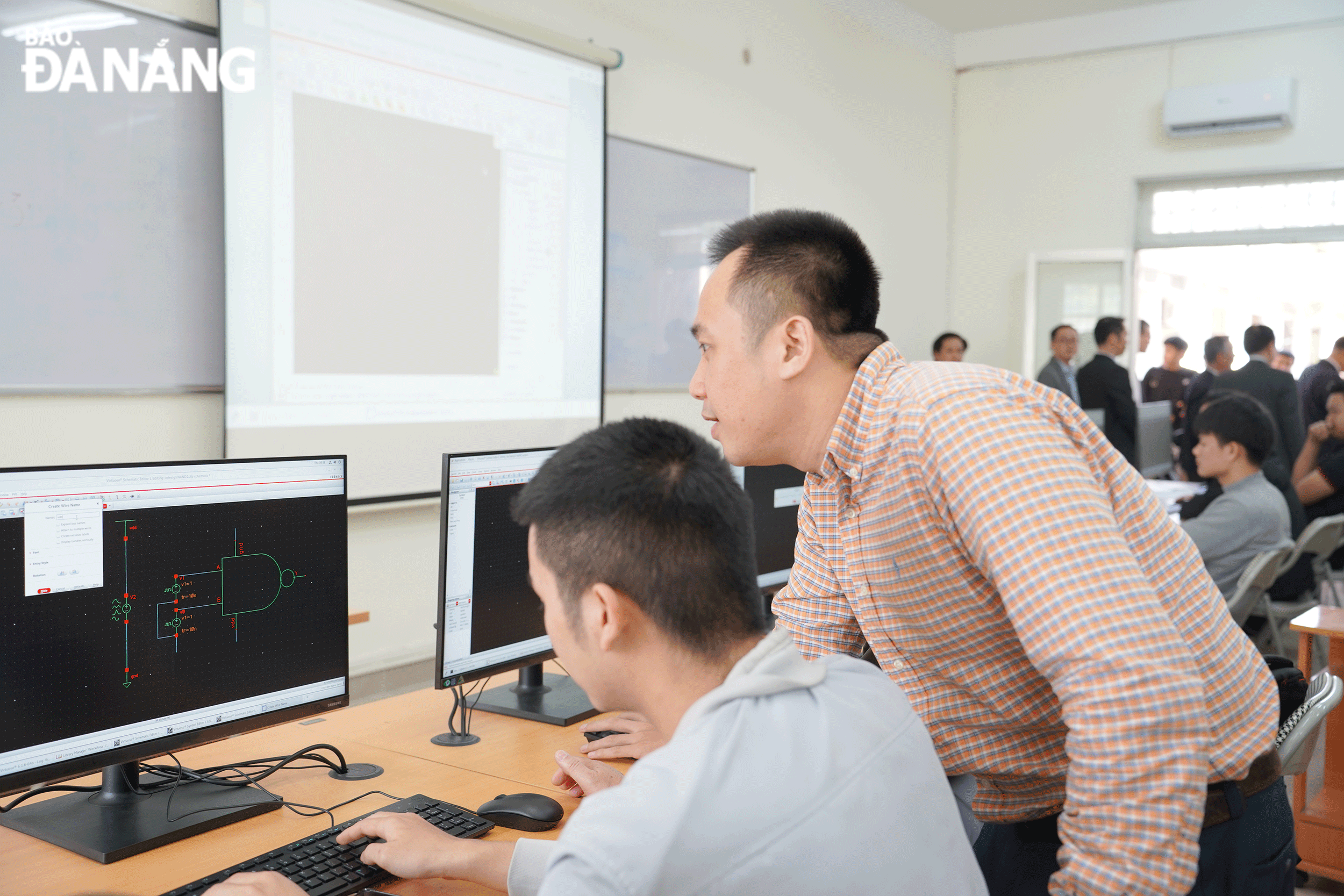Da Nang ready to train semiconductor human resources
The Da Nang People's Council has just issued Resolution No. 57/2024/NQ-HDND stipulating policies for developing human resources in semiconductors and artificial intelligence in the city to concretise the National Assembly’s Resolution No. 136/2024/QH15 on the organisation of urban government and piloting a number of specific mechanisms and policies for the development of the city.
 |
| Students of the University of Science and Technology in a class about microchip design. Photo: HOANG NHUNG |
Outstanding preferential policies
Da Nang has proposed many outstanding support policies with a total estimated budget of about VND 873 billion, including support policies on income and accommodation costs for experts and scientists working in semiconductors, and artificial intelligence industries with the following criteria: having excellent capacity and expertise, or have the capacity to gather and develop teams in the fields.
Accordingly, the policy for experts and scientists is to receive a one-time initial income of VND100 million/month for those working at enterprises, and a maximum income of VND50 million/month for those working at public service units and state agencies. The city offers maximum support of VND20 million/month for accommodation costs for one year. At the same time, experts and scientists will receive a financial support of VND 25 million for each intellectual property right, exclusive patent published in Viet Nam, if published internationally, the support level is VND 50 million.
Within 5 years from the date of recruitment, experts and scientists working in the field of semiconductor microchips and artificial intelligence must meet at least one of the following criteria: having had an income of VND1 billion/year for those working in Viet Nam or an income of VND5 billion/year for those working abroad; having a doctorate degree or higher and having scientific and technological activities related to the field of semiconductor microchips and artificial intelligence; having at least 3 years of experience in one of the important roles such as director, manager, senior engineer at an enterprise operating in the field of semiconductor microchips and artificial intelligence, with global revenue of VND 2,500 billion VND or more; or at an educational institution with a major in the field of semiconductor microchips and artificial intelligence that is among the top 400 educational institutions in the world. Experts and scientists must be recruited in Da Nang for a minimum period of one year.
In addition, students majoring in semiconductor microchips and artificial intelligence at training institutions in the city can borrow up to VND180 million in tuition fees for the entire training programme.
If students graduate and work for at least 3 years at enterprises operating in the field of semiconductor microchips and artificial intelligence in the city, they will be exempted from 100% of the initial principal and interest.
Associate Professor, Dr. Nguyen Huu Hieu, President of the University of Science and Technology - the University of Da Nang, said that these policies not only bring practical benefits to learners but also contribute to promoting the demand for high-quality human resources in the field of semiconductors, and meeting the development requirements of society.
In addition, the school is committed to allocating at least 8% of tuition revenue to build a scholarship fund to encourage learning, in which the lowest scholarship level is equivalent to the tuition fee of the training programme that students must pay.
Along with the goal of training 5,000 semiconductor engineers for the city by 2030, the human resource support policy is a testament to the city's continuous efforts in orienting the construction and development of the semiconductor industry, and striving to become the country's hi-tech center.
Expanding training scale
In the 2024-2025 school year, the University of Science and Technology opens a new major in microelectronics - circuit design under the field of electronics and telecommunications engineering. Students are taught to analog microchip design, digital microchip design, physical design, etc.
The university has already built laboratories on basic and advanced electronics, microchip design practice rooms, and basic electronics laboratories.
To improve the quality of training, the university has coordinated with the National Innovation Centre (NIC) and experts with many years of experience in the field of semiconductors in the US to organise specialised training courses to improve the professional qualifications of lecturers in the field of microchip design, as well as worked with large companies such as Cadence, Synopsys, Renesas, Siemens and Microchip to build and develop appropriate teaching content.
During the 2024 - 2025 academic year, the Viet Nam - Korea University of Information and Communications Technology recruits 60 students for the first course of semiconductor design engineers. This number is expected to increase to 600 - 1,000 engineers by 2028.
Associate Professor, Dr. Nguyen Gia Nhu, Principal of the School of Technology and Engineering under the Duy Tan University said that the school is currently training 148 students in semiconductor design, 102 students in AI, and 4,200 students studying related fields to semiconductor design and AI.
According to Associate Professor, Dr. Nguyen Huu Hieu, the city has prepared resources, whilst the schools are in charge of building training programmes close to reality, develop modern facilities, train highly specialised lecturers, and expand cooperation with businesses in the industry.
Currently, the University of Science and Technology, the Viet Nam - Korea University of Information and Communications Technology, the University of Technical Education, and the Duy Tan University have opened the microchip engineering training programme and officially enrolled students since August 2024 with 320 students. The universities have also opened 3 training classes to convert graduates from microchip engineering major to microchip design for 41 students and 59 lecturers.
Reporting by HOANG NHUNG - Translating by M.DUNG







